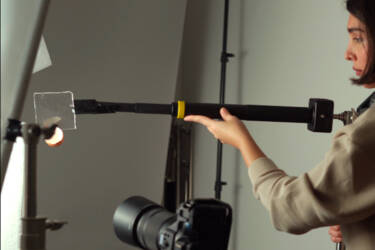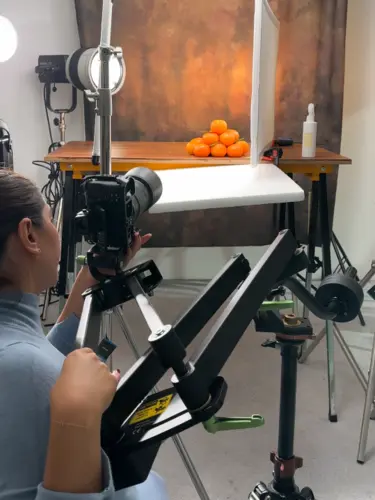How to set up your camera for TikTok (next step tips for vertical video)

Filmmaker and editor Negin Gatavian has amassed more than 1.4 million likes on her TikTok. Here’s how she films her slick commercial product videography
Choose the right gear
Camera
The Z7II is my go-to because of its exceptional image quality and versatility. The 45.7MP full-frame sensor captures incredible detail, which is crucial for the high-quality standards of commercial work. I also appreciate its dynamic range, which is helpful during post-production, especially in colour grading.
When purchasing a camera, content creators should consider several key factors: resolution – the Z7II’s 45.7MP offers incredible detail – and strong video capabilities (4K and excellent autofocus is a must). Finally, look at the ergonomics and weight of the camera. A comfortable grip is important for long shooting sessions, and the Z7II is designed with that in mind.
Lenses
The NIKKOR Z MC 105mm f/2.8 VR S captures close-up details of products and subjects, which is essential for commercial content. The optical quality is superb, and the ability to shoot macro adds a unique dimension to my videos. My NIKKOR Z 24-70mm f/2.8 S adds greater versatility and is great for everything from interviews to dynamic scenes.
Lighting
Good lighting is crucial for video quality. I use the Nanlite Forza series to achieve a professional look.
Microphones
As great audio elevates the production value, I use a RØDE VideoMic Pro shotgun mic to ensure high-quality sound.
Read more: What sound captures do I need for professional videography?
Tripods and gimbals
A sturdy tripod from Manfrotto will stabilise shots and a gimbal allows for a smooth motion when moving around.
Cage
While the Z7II is comfortable to handle for vertical video, I also use a Smallrig cage to mount the camera on a tripod.
Monitor
The Atomos Ninja V recorder helps focusing and ensuring everything is framed perfectly.
Backgrounds
A clean, professional backdrop can make a big difference in the final video, so I opt for seamless paper and fabric backdrops for various set-ups.
Read more: 10 must-have accessories for your Nikon Z mirrorless camera


Camera video settings
Setting up your camera for filming involves several important settings that can significantly enhance the quality of your video. Here’s what I use on the Z7II:
Resolution (standard)
For most of my projects, I shoot in 4K resolution (3840 x 2160) at 24 frames per second (fps). This frame rate provides a cinematic look, which is preferred for narrative and commercial work.
Resolution (slow motion)
For slow-motion shots, I typically shoot at 120fps in 1080p resolution (1920 x 1080). This allows for smooth, slow-motion playback when slowed down to 24fps, providing a dramatic effect in my videos.
Shutter speed
The rule of thumb is to set your shutter speed at double your frame rate to achieve natural motion blur (so for 24fps, set your shutter speed to 1/50 sec, for 120fps, set it to 1/250 sec). Depending on the situation (such as filming a water droplet), I normally use a faster shutter speed to have smooth motion.
Focus
Use continuous autofocus (AF-C) for moving subjects and consider using manual focus for static shots to maintain control.
White Balance
Set your White Balance manually to match your environment. I often adjust the kelvin value based on the lighting conditions. This avoids colour shifts and ensures consistent colour temperatures across your footage. Use a grey card or a White Balance tool to set it accurately.
Flat picture profile
Use a flat picture profile (such as Nikon’s N-Log) for better dynamic range and flexibility in colour grading during post-production.
Audio set up
Connect your microphone directly to the camera for synchronised audio recording. Before filming, check your audio levels in the camera settings to ensure they are not peaking or too low. Aim for levels around -12dB to -6dB for optimal recording.
Stabilisation
If you’re filming handheld, make sure to enable in-body stabilisation (if available) to reduce camera shake.
Monitor and histogram
Use an external monitor, if available, and keep an eye on the histogram to ensure your exposure is balanced.
Crafting content that engages
For content that resonates with the algorithm, keep these tips in mind.
Trending topics are crucial
Content that taps into current events or popular trends tends to perform better due to its timely and relevant nature.
High-quality, engaging content is essential
This includes visually appealing videos, compelling storytelling and relatable themes. YouTube suits in-depth, informative or entertaining content, while Instagram and TikTok favour shorter, concise videos that deliver value quickly or entertain. Using relevant hashtags and optimising your titles and descriptions for search can also enhance visibility.
Explore revenue streams
As I grew my audience, I explored additional revenue streams. I began collaborating with brands through sponsored content, which has become a significant part of my income, while also creating high end commercials for brands to help them reach their audience.


Engage with your audience
Replying to comments, asking for feedback and creating content based on their interests has fostered my loyal following and has led to better content ideas.
Don’t exhaust yourself
If I could start again, I would tell myself to focus on quality over quantity from the outset. It’s tempting to churn out a lot of content to gain visibility, but investing time into creating high-quality, well-thought-out videos pays off in the long run.
Embrace the learning process and don’t be afraid of failure. Each mistake is an opportunity to grow and improve. Networking with other creators early on could have accelerated my learning curve, so I would encourage myself to build relationships and collaborate more.
Self-care is important. The journey of a content creator can be overwhelming, and maintaining a balance between content creation and personal life is vital for sustainability. Taking breaks and prioritising mental health is crucial for long-term success in this field.
Follow Negin on TikTok here.
More in Videography
Content creation 101
How to become a content creator on Instagram

Unlock greater creativity










